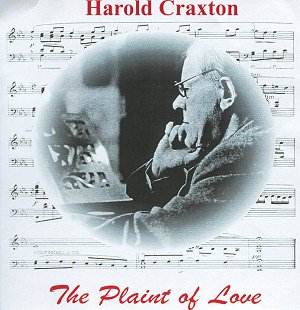Harold CRAXTON (1885-1971)
1. The Plaint of Love (from a Lute Book, c. 1535).
Freely transcribed by Harold Craxton. Pianoforte.
2 Two Almans by Richard Johnson,
transcribed by Harold Craxton. Violoncello and pianoforte.
3 O mistress mine (Shakespeare). Baritone and pianoforte.
4 Meditation (Vita in ligno moritur) (from a Lute Book, c. 1530).
Freely arranged by Harold Craxton. Pianoforte.
5 A Maske by Giles Farnaby,
transcribed by Harold Craxton. Violoncello and pianoforte.
6 It was a lover and his lass (Shakespeare). Soprano and pianoforte.
7 Siciliano and Rigadon (c. 1735).
Freely transcribed by Harold Craxton. Pianoforte.
8 Sonata in B flat by T. A. Arne,
transcribed by Harold Craxton. Violoncello and pianoforte.
9 A Requiem (R. L. Stevenson). Baritone and pianoforte.
10 Woodland Lullaby. Pianoforte.
11 Oh! To see the Cabin Smoke (P. J. O'Reilly). Soprano and
pianoforte.
Two Mazurkas. Pianoforte.
12. 1. F minor.
13. 2. D flat major.
14. Beloved, I am lonely (May Aldington). Baritone and pianoforte.
15. Mavis (Lefevre). Baritone and pianoforte.
16. A Shepherdess in Porcelain. Pianoforte.
Two Pastoral Preludes. Pianoforte.
17. 1. Heather Bells.
18. 2. Bird Song ("I love my love and my love loves me").
19. Hearts in Love (Edward Oxenford). Soprano and pianoforte.
20. The Snowdrop (Norman Gale). Soprano and pianoforte.
21. A Tahitian Dance (founded upon native rhythms). Pianoforte.
22. Bourrée Humoresque (founded on an 18th Century tune).
Pianoforte.
 Soprano: Caroline Goodwin
Soprano: Caroline Goodwin
Baritone: James McOran Campbell
Violoncello: Alison Moncrieff Kelly
Piano: Christopher Howell.
Rec Craxton Studios, London, June 2000
 HAROLD CRAXTON TRUST
HCRAX1 [64.31]
HAROLD CRAXTON TRUST
HCRAX1 [64.31]
Details contact: ckhowell@net2000.it

If the end result is anything to go by considerable thought went into the
selection and sequencing of these short pieces. The music itself is variable
from the not so desperately interesting (e.g. the arrangement of a cello
sonata by Arne and the Two Almans) to the title track Plaint of
Love which is given a very romantic overlay almost as if transcribed
by Rachmaninov. The Meditation is similarly inclined though not as
intense. The Two Mazurkas are serious little pieces - neatly turned.
The freshly executed Bourrée Humoresque is delightfully rapped
out while A Shepherdess In Porcelain suggests all the fragile gentility
associated with its Ketèlbeyan title. The sentimental Siciliano
and Rigadon bring memories of sixties French film music while Woodland
Lullaby is redolent of Macdowell's woodland blooms. I liked the mesmeric
Tahitian Dance which, avowedly, is founded on native rhythms. It has
the air of Norman Peterkin's elusive oriental suites (now there's a recording
project for Mr Howell!) crossed with the Godowsky Java Suite. The
Farnaby Maske boast greater interest than the other arrangements of
'antiquitie'. The Two Pastoral Preludes for solo piano offer an
impressionistic Heather Bells with the lightest skirling tartan touches
and Bird Song which is lovely pictorial piece with deftly challenging
harmonies - think Finzi in the Grand Fantasia.
Beloved I Am Lonely is excellent with well thought out word definition
and a sentimental but never cloying approach. The song deserves to have wider
currency. O Mistress Mine shows off the baritone's sturdy qualities
and darkly virile colouring - a John Shirley-Quirk in the making. Caroline
Goodwin in It Was Lover And His Lass is a very characteristic setting
in an edition by Chris Howell. Certainly the material is less twee than Oh
To See The Cabin Smoke which is to my ears rather limp salon material
- a step down from MacDowell. The same can be said of The Snowdrop
with its twee bells and of Mavis - all very 'piano stool'. In A
Requiem, by Stevenson, we are again into strong word setting though
the singer's mournful tone is rather overdone. He does however have a very
nicely judged line in variegated gradation of dynamics - not following the
obvious line. The setting of Edward Oxenford's Hearts In Love is
distinguished by skilled word-setting and challenging and intriguing tonality
in the repeated bell motif.
The piano is sympathetically played by Chris Howell but the instrument does
not evince a very generous tone. Mr Howell to whom this project owes a great
deal is a welcome and constant presence throughout each of these pieces.
The notes are very full with the sung texts and comprehensive full track-listings
and timings are provided.
Rob Barnett
See also Christopher Howell's profile of Harold
Craxton
ENQUIRIES and WEBSITE
There's now a Craxton website and the address is:
www.craxtonmemorialtrust.org.uk.
Apart from info about the Memorial Trust, the CD, Chris Howell's notes for
the CD, catalogue of musical works it also has two extracts from Craxton's
unfinished, unpublished autobiography and a memoir of Janet Craxton by Denis
Matthews.
Craxton Studios, 14 Kidderpore Ave, London NW3 7SU. Orders for the CD can
be placed with the Craxton Studios for £12.00 per CD price incl of
post/packing.
CRAXTON MEMORIAL TRUST
You can find more information about the Trust from:-
Jane Craxton
15 Cambridge Road
North Uxbridge
Middx UB8 1BQ
or email to
info@craxtonmemorialtrust.org.uk

